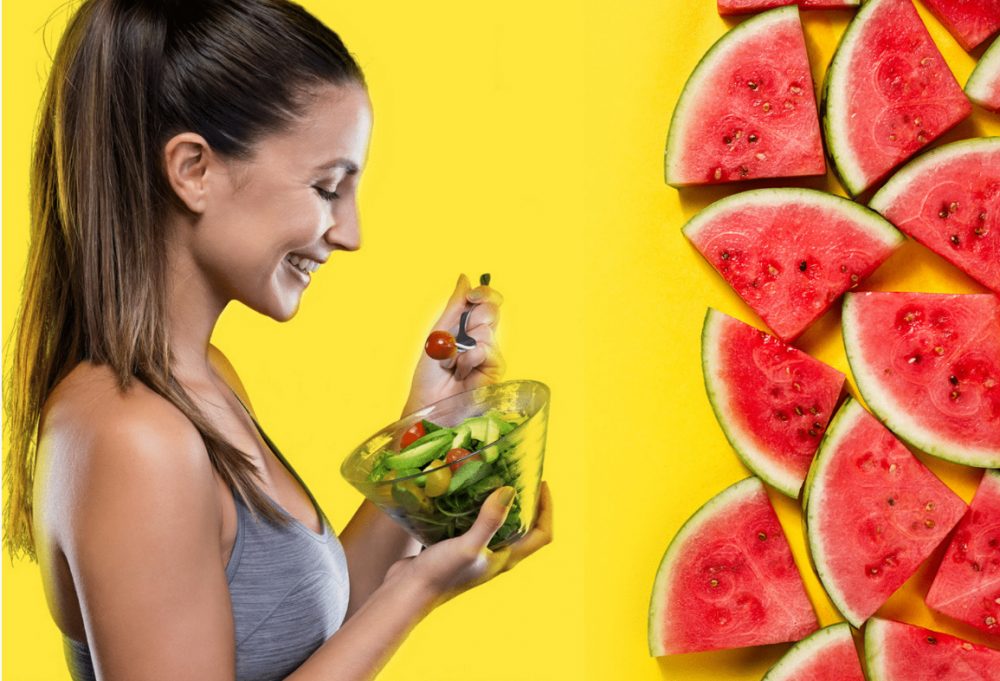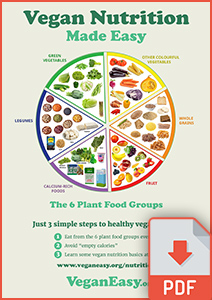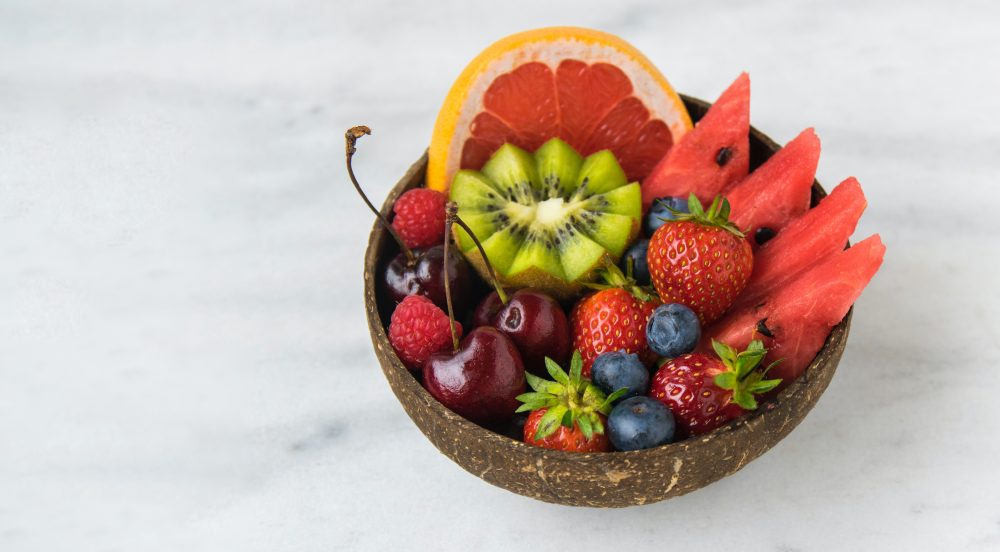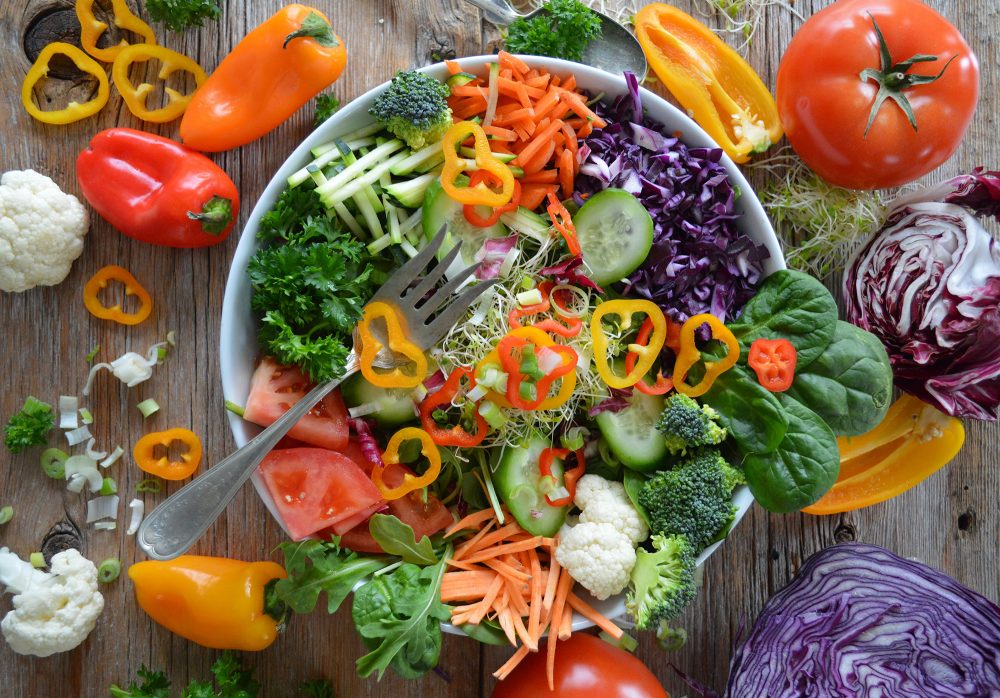Nutrition 123
We can obtain all the essential nutrients we need without eating animal products.
Nutritionist Dr. Amanda Benham makes it easy with 3 simple steps to vegan health.

The Short Answer…
Sometimes nutrition can be a confusing subject at first, so don’t be daunted by it. To help ensure you get what you need from your plant-based diet, remember:
- Eat from the six plant food groups every day
- Supplement with vitamin B12 and vegan vitamin D during winter.
Please seek professional nutrition advice if you have any special dietary restrictions or health needs or are pregnant, lactating, planning a pregnancy or have children eating a plant-based diet. It’s always better to be proactive with your health (and that of your family) rather than waiting until there’s a problem.
Contents
- Introduction
- Step 1 – Eat From These Six Plant Food Groups Every Day
- Step 2 – Avoid “Empty Calories”
- Step 3 – Learn Some Vegan Nutrition Basics
- Can we really get all the nutrients we need without eating animal products?
- Where can I get protein on a plant-based diet?
- What about vitamins?
- What about minerals?
- Can we get essential fatty acids without eating fish?
- What about trace elements?
- Conclusion
Introduction

Dr. Amanda Benham PhD
Accredited Practicing Dietitian, Accredited Nutritionist
Fellow of the Australasian Society of Lifestyle Medicine
I love helping people get onto a vegan eating plan that’s not only kinder to the animal kingdom and the environment, but can also help you enjoy better health, both now and in the future. Research has found that eating a whole foods plant-based diet and avoiding animal products can reduce your chances of obesity, diabetes, high blood pressure, high cholesterol, stroke, heart disease and some cancers.
I understand that sometimes eating vegan can be daunting in the beginning, because eating a healthy vegan diet isn’t just about what not to eat – you need to know what to eat as well.
The team at Vegan Easy have provided 30 days of recipes to get you started on their 30 Day Vegan Easy Challenge, but knowing some basic guidelines and nutrition information will help you maintain a healthy vegan eating pattern long after you’ve completed the Challenge.
Let’s start with three simple steps towards healthy vegan eating…
The Three Steps to Healthy Vegan Eating
1 Eat From These Six Plant Food Groups Every Day
 Download a handy printable poster
Download a handy printable poster
Take to Office Works and print at A3 size
Grains
This group includes rice, oats, barley and other grains as well as foods made from grains such as pasta, couscous and cornmeal. It also includes breakfast cereals and foods made from flour, such as bread, wraps and crackers. Choose whole grains (such as brown rice) and wholemeal products whenever possible, as these are richer in essential nutrients and fibre than refined grains.
Green Vegetables
This group includes leafy greens (like spinach, kale, silver beet, cabbage), Asian greens (such as bok choy, pak choy, kai lan) and other greens like broccoli, zucchini, green peas, green beans, asparagus etc. Greens provide essential vitamins and minerals and are rich in beneficial phytonutrients, such as antioxidants. Buy your greens fresh if you can, but frozen is fine too. Frozen peas, beans and spinach are good to have on standby in case you run out of fresh greens.
Other Colourful Vegetables
This group includes orange vegetables (like carrots, pumpkin and sweet potato), red vegetables (like tomatoes and red capsicum), yellow vegetables (like corn, yellow squash and yellow capsicum) and purple vegetables (like eggplant and red cabbage). The colourful vegetables contain many beneficial components, including beta-carotene, which we convert to vitamin A.
Legumes
This group includes lentils, chick peas and beans (like kidney beans, pinto beans, black beans, lima beans, borlotti beans, cannellini beans, navy beans and baked beans), as well as soy beans and foods made from them like tofu, tempeh and Textured Vegetable Protein (TVP). Legumes are a staple in a healthy vegan eating plan, as they are rich in protein (including the essential amino acid lysine), iron, zinc and other essential nutrients. Being rich in fibre and having a low glycaemic index (GI) means that they are very satisfying and keep you feeling full for longer, providing sustained energy for hours. You can find several varieties of tinned legumes near the baked beans in the supermarket, and these are ready to use (after draining) in dips, salads, pasta sauces, stews and soups. It’s also easy and even more economical to cook your own dried beans – just soak in lots of water for 8-12 hours, then rinse, boil until tender, then rinse again. You can freeze them in meal-size batches and just defrost in the refrigerator before using.
Fruit
Fruit is nature’s sweet treat and also provides fibre and beneficial antioxidants. Some fruits are rich in vitamin C, such as oranges, grapefruit, lemons, kiwifruit, pineapple, strawberries and paw paw, and some are rich in beta-carotene (for vitamin A) such as apricots, rockmelon, cherries, plums, paw paw and mangoes. For full nutritional benefit, fruit is best eaten in its whole, raw form rather than being juiced, dried or cooked.
Calcium-rich foods
Calcium (along with vitamin D and exercise) is important for our bones, and fortunately we don’t need dairy products to get enough of this essential nutrient. Many plant milks have added calcium (check the label and look for at least 120 mg calcium per 100 ml), and so do some soy yoghurts. Other plant foods rich in absorbable calcium include Asian greens, rocket and kale, and some varieties of tofu are rich in calcium, as either magnesium or calcium salts can be used in making tofu. (Look for 509 or 516 in the ingredients list.)
How much do I need?
If you’re not sure about how much to eat from each of the plant food groups, try eating two cups (measured after cooking, for foods that are eaten cooked like grains and legumes) from each group each day. This will go a long way to meeting most nutrient requirements, and you can add more than this or eat extra snacks according to your appetite. See our Guidelines for Planning Vegan Meals for more detail.
When possible, choose whole foods and avoid buying a lot of packaged foods with long ingredient lists. This will generally make your daily diet more nutritious and lower in added fats, salt and sugar.
That means healthier!
“A well balanced vegan diet can provide many health benefits, is suitable for all ages and can significantly lower the risk of common health problems, such as heart disease, stroke, diabetes, obesity, high blood pressure, high cholesterol and cancer.”
– Academy of Nutrition and Dietetics*
2 Avoid “Empty Calories”, Make Better Choices

Choose unprocessed, natural foods, rich in fibre and vitamins
Some foods can add a lot of calories without adding much nutrition, and can contribute to unwanted weight gain and/or nutrient deficiencies, harming our health.
Foods containing “empty calories” include oils, margarine and foods rich in added sugar (such as soft drinks and lollies) and foods based on refined grains like white flour. These can displace more nutritious foods in the diet and are best kept to a minimum.
For people who need a lot of calories or who want to gain weight, nutritious high fat plant foods like avocado, nuts, nut butters, seeds and tahini are a much healthier choice than empty calorie foods. Coconut products are also high in fat, but as it’s saturated fat they are not recommended as part of your daily diet.
3 Learn Some Vegan Nutrition Basics And Get Enough Essential Nutrients

It’s good for everyone to understand a little about nutrition and how to make sure they are getting enough of the essential nutrients (like vitamins and minerals) that we all need to be healthy. Here you’ll find answers to common questions about getting the nutrients you need on a plant-based diet.
Can we really get all the nutrients we need without eating animal products?
Yes! Humans have no need to eat any animal products at any stage of life. As with any eating pattern, a little bit of planning and know-how is important to help us make good food choices. Here are some nutrition basics on nutrients you might need to know more about.
Where can I get protein on a plant-based diet?
Protein is an important nutrient for growth and has many functions throughout the body, including being a major component of muscles. Protein is composed of substances called amino acids. There are 20 different amino acids we require for protein synthesis but only nine of these are considered essential as our bodies cannot make these and so these need to be provided in our diet.
Nearly all foods contain protein and people on a vegan diet can get plenty of protein by basing their daily diet on nutritious plant foods such as lentils, beans, chickpeas, tofu, tempeh, grains, nuts, seeds, and vegetables. Limiting your intake of “empty calorie” foods and eating more whole plant foods will increase the protein density of your daily diet.
People who are doing strength training to increase their muscle mass often use protein powders to boost their protein intake in a convenient way. Plant-based protein powders are readily available.
What about vitamins?
Vitamins are essential nutrients that humans need to obtain in order to be healthy. The only vitamins that are not readily obtainable from unprocessed plant foods are Vitamin B12 and Vitamin D. All the other essential vitamins are readily obtainable from eating a range of plant foods, including vegetables, fruit, legumes, nuts, seeds and whole grains. It is important for anyone eating a plant-based diet to know about vitamin B12 and vitamin D and where to get them.
Vitamin B12
Vitamin B12 is produced by bacteria and is found in soil but is scarce in plant foods. (Eating soil or unwashed vegetables is unsafe and not a reliable way to get vitamin B12 and is definitely not recommended!) People on plant-based diets can obtain vitamin B12 by eating fortified foods (i.e. foods that have had vitamin B12 added, such as some soymilks, Marmite and some meat analogues – check the label). At least three serves of vitamin B12-fortified foods per day are required to meet the minimum recommended intake.
The easiest and most reliable way to ensure that you get adequate vitamin B12 is to take a vitamin B12 supplement.
This can be either in the form of a daily vitamin B12 tablet, lozenge or liquid containing at least 200 mcg of vitamin B12 , or a twice-weekly dose of 2000 mcg of vitamin B12. The form recommended for everyone except smokers to take is cyanocobalamin B12, as it is stable, proven to prevent and reverse deficiency and can be converted to both the active forms of B12 our body needs. (It is recommended that smokers take hydroxocobalamin B12.)
It is especially important that women of reproductive age, infants and children obtain enough vitamin B12 each day as it essential for brain development and growth. As we age we don’t absorb vitamin B12 as well, so higher intakes (e.g. 1000 mcg per day) are recommended for older people.
Vitamin D
Vitamin D can actually be obtained from the sun! Ten to thirty minutes of daily mild sun exposure on bare skin without sunscreen is recommended. During winter or for people who don’t get much sun exposure a Vitamin D supplement may be required. Vegan-friendly vitamin D2 and D3 supplements are available.
What about minerals?
There are several minerals that are essential for humans to obtain in order to be healthy. Minerals are chemical elements and cannot be synthesized by plants or animals. All minerals are ultimately obtained from the earth, and the content of minerals in plants varies dependent on the soil they are grown in. Humans need to ensure they obtain adequate amounts of important minerals, including iron, zinc and calcium.
Iron
Iron is important for our red blood cells and good sources include legumes (such as chickpeas, lentils, navy beans, pinto beans, kidney beans, soybeans) tofu, tempeh, whole grains, fortified vegan meat analogues, breakfast cereals, pepitas and green vegetables. Women of reproductive age generally need more iron than men.
Note: Vitamin-C rich foods (like orange juice, tomatoes, capsicum and raw green vegetables) help to increase the amount of iron we absorb so try eating these foods in the same meal. Tea and coffee can interfere with iron absorption so it’s best to have these between meals rather than with them.
Calcium
Calcium is important for our bones, along with vitamin D and exercise. As mentioned above, the best plant sources include kale, leafy Asian vegetables (like bok choy), rocket, calcium-set tofu and fortified plant milks. (Check the label and look for plant milks that have at least 120 mg calcium per 100 ml.) Other plant foods that contain moderate amounts of absorbable calcium are white beans, almonds, figs, and oranges.
Zinc
Zinc has many functions throughout the body and sources include soy products, legumes, nuts, seeds (especially pepitas), whole-grains and green vegetables. Men generally need more zinc than women.
Can we get essential fatty acids without eating fish?
Yes! Essential fatty acids are components of fats that humans need to have in their diets. The two types of essential fatty acids that are required are called omega−6 fatty acids (of which linoleic acid is essential) and omega−3 fatty acids (of which alpha linolenic acid is essential).
Omega-6
Omega−6 – linoleic acid is widely available from a range of foods including nuts, seeds, avocado, grains and vegetable oils. We do not require much omega−6 so even low fat diets can provide adequate amounts of linoleic acid.
Omega-3
Omega−3 – alpha linolenic acid (ALA) is obtained from flaxseeds (sprinkle 2-3 teaspoons ground seeds over cereal/muesli or add to a smoothie), chia seeds and walnuts.
Our bodies need to convert the omega−3 ALA (from flaxseeds etc) to DHA and EPA and we do this with variable efficiency. Another option to ensure we get enough of these omega−3s is to supplement with algal-derived DHA/EPA, and this is recommended for pregnant and lactating women and small children. (Algae is the original source of omega-3s for fish.)
What about trace elements?
Trace elements are mineral elements that are needed in small amounts in human nutrition. They are derived from soil and the amount of a particular trace element in a food will depend on the soil the food was grown in. Unfortunately, modern farming methods tend to deplete the soil of trace elements, resulting in low amounts in the foods grown on those soils. In Australia, iodine and selenium levels in soil tend to be low.
Iodine
Iodine is important for healthy thyroid function in adults and for brain development in infants and children. Iodised salt is a reliable source of iodine, and adding a quarter to a third of a teaspoon per day to meals will boost iodine intake significantly. Bread with iodised salt added is another source of iodine, and some seaweeds are rich in iodine. However, the amount of iodine in seaweed varies considerably, and the seaweed kelp (also known as kombu) is so rich in iodine that it is not recommended as it contains too much iodine, which can be harmful to health. Another alternative is supplementation: multivitamin tablets containing about 100-150 micrograms of iodine will help ensure an adequate iodine intake for most people. Iodine is important for brain development and so it is very important that pregnant and lactating women have an adequate intake, such as from a prenatal multivitamin.
Selenium
Brazil nuts are a rich source of selenium, and just one or two brazil nuts a day will meet requirements. Alternatively, most multivitamin supplements contain selenium.
Here’s to your good health!
Dr. Amanda Benham PhD
Accredited Practicing Dietitian, Accredited Nutritionist, Fellow of the Australasian Society of Lifestyle Medicine
Note: The information presented here is of a general nature only and is not intended to replace individualised advice from an appropriately qualified health professional who is experienced in plant-based diets and nutrition. It is strongly recommended that you have a nutrition consultation when you adopt a plant-based eating pattern, and be aware that most medical and health practitioners are not trained in plant-based nutrition. See pbnutrition.com.au for more information.
